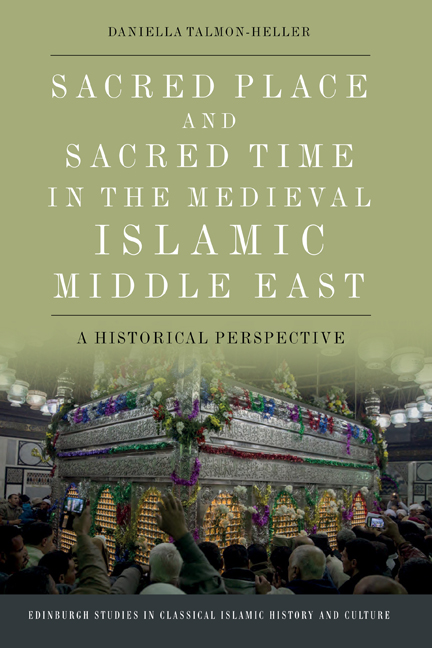Book contents
- Frontmatter
- Contents
- List of Figures
- Acknowledgements
- Map of the Middle East
- Introduction
- 1 Etic Concepts and Emic Terms
- 2 The State of the Art
- Part One A Sacred Place: The Shrine of al-Husayn’s Head
- Part Two A Sacred Time: The Month of Rajab
- Final Comments: Spacial and Temporal Sanctity
- Works Cited
- Index
1 - Etic Concepts and Emic Terms
Published online by Cambridge University Press: 17 October 2020
- Frontmatter
- Contents
- List of Figures
- Acknowledgements
- Map of the Middle East
- Introduction
- 1 Etic Concepts and Emic Terms
- 2 The State of the Art
- Part One A Sacred Place: The Shrine of al-Husayn’s Head
- Part Two A Sacred Time: The Month of Rajab
- Final Comments: Spacial and Temporal Sanctity
- Works Cited
- Index
Summary
Space and time are universal categories, and the ways in which religious persons relate to them are often widely shared across cultures. Mircae Eliade begins the first chapter of his influential The Sacred and the Profane (1959) by defining some of those ways. ‘For religious man’, he posits, ‘space is not homogenous. He experiences interruptions, breaks in it; some parts of space are qualitatively different from others’. Eliade describes those parts as characterised by a strong ‘magnetism’, subsequently claiming that identifying the sacred ‘is not a matter of theoretical speculation, but of a primary religious experience that precedes all reflection on the world’. He also notes that places considered sacred are protected from defilement by the threat of grave penalties for the violation of their sanctity; they are surrounded ‘by a network of restrictions and disabilities which forbid them to be used by men except in particular ways, and in certain cases forbid them to be used at all …’ William Robertson Smith, who defined holy places and things as set apart by society in order to emphasise their symbolic value, notes that the restrictions imposed on access to the holy place stem from the notion that unclean persons and actions will not be tolerated in the sacred place.
Chapter Two of Eliade's The Sacred and the Profane opens with another, parallel claim about discontinuity: ‘Time, too, like space, is neither homogenous nor continuous’. He then pronounces a binary division between sacred and profane time: whereas the former is circular and embedded in the liturgical calendar, the profane has ‘an ordinary temporal duration in which acts without religious meaning have their setting’. Emile Durkheim, who also stresses the distinction between profane and sacred realms considered superior in dignity and transcendental power, likewise regards the division as a universal phenomenon. In his words, all known religious beliefs present one common characteristic: ‘they presuppose a classification of all the things, real and ideal … into two classes or opposed groups … [:] profane and sacred’. The repertoire of holy things, however, stresses Durkheim, varies from religion to religion.
- Type
- Chapter
- Information
- Sacred Place and Sacred Time in the Medieval Islamic Middle EastA Historical Perspective, pp. 9 - 16Publisher: Edinburgh University PressPrint publication year: 2020



